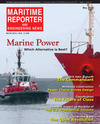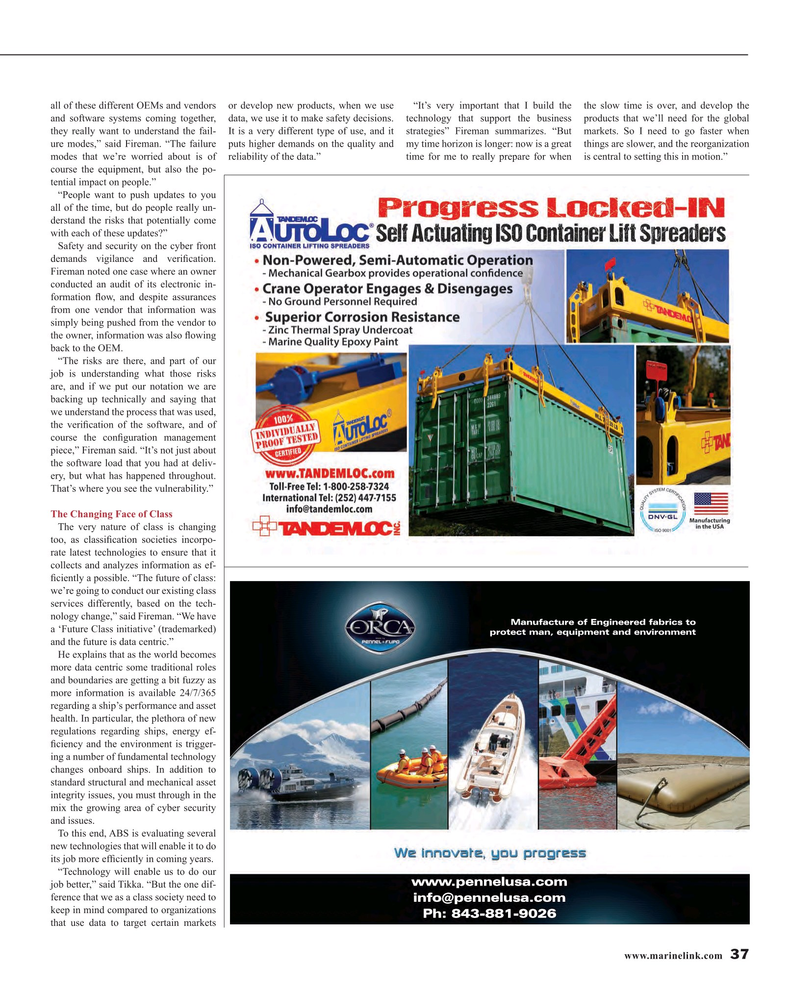
Page 37: of Maritime Reporter Magazine (May 2016)
The Marine Propulsion Edition
Read this page in Pdf, Flash or Html5 edition of May 2016 Maritime Reporter Magazine
all of these different OEMs and vendors or develop new products, when we use “It’s very important that I build the the slow time is over, and develop the and software systems coming together, data, we use it to make safety decisions. technology that support the business products that we’ll need for the global they really want to understand the fail- It is a very different type of use, and it strategies” Fireman summarizes. “But markets. So I need to go faster when ure modes,” said Fireman. “The failure puts higher demands on the quality and my time horizon is longer: now is a great things are slower, and the reorganization modes that we’re worried about is of reliability of the data.” time for me to really prepare for when is central to setting this in motion.” course the equipment, but also the po- tential impact on people.” “People want to push updates to you all of the time, but do people really un- derstand the risks that potentially come with each of these updates?”
Safety and security on the cyber front demands vigilance and veri? cation.
Fireman noted one case where an owner conducted an audit of its electronic in- formation ? ow, and despite assurances from one vendor that information was simply being pushed from the vendor to the owner, information was also ? owing back to the OEM.
“The risks are there, and part of our job is understanding what those risks are, and if we put our notation we are backing up technically and saying that we understand the process that was used, the veri? cation of the software, and of course the con? guration management piece,” Fireman said. “It’s not just about the software load that you had at deliv- ery, but what has happened throughout.
That’s where you see the vulnerability.”
The Changing Face of Class
The very nature of class is changing too, as classi? cation societies incorpo- rate latest technologies to ensure that it collects and analyzes information as ef- ? ciently a possible. “The future of class: we’re going to conduct our existing class services differently, based on the tech- nology change,” said Fireman. “We have
Manufacture of Engineered fabrics to a ‘Future Class initiative’ (trademarked) protect man, equipment and environment and the future is data centric.”
He explains that as the world becomes more data centric some traditional roles and boundaries are getting a bit fuzzy as more information is available 24/7/365 regarding a ship’s performance and asset health. In particular, the plethora of new regulations regarding ships, energy ef- ? ciency and the environment is trigger- ing a number of fundamental technology changes onboard ships. In addition to standard structural and mechanical asset integrity issues, you must through in the mix the growing area of cyber security and issues.
To this end, ABS is evaluating several new technologies that will enable it to do its job more ef? ciently in coming years. “Technology will enable us to do our www.pennelusa.com job better,” said Tikka. “But the one dif- ference that we as a class society need to [email protected] keep in mind compared to organizations
Ph: 843-881-9026 that use data to target certain markets www.marinelink.com 37
MR #5 (34-41).indd 37 5/3/2016 3:24:23 PM

 36
36

 38
38
